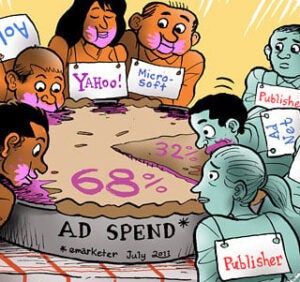“Data Driven Thinking” is written by members of the media community and containing fresh ideas on the digital revolution in media.
Today’s column is written by Marc Schwartz, who is EVP, Global Director of Performance Analytics at McCann Worldgroup.
I recently left Cannes, where the majority of the Lions were awarded to creative agencies. Creative agencies and clients prioritize trophies and often winning can define a career path, a campaign idea, or a brand. It is not common, outside of a direct marketing or digital agency, for an Effie or Cannes Effectiveness Award to deliver the same impact on a career or brand. For digital, social or CRM shops, data has been the fuel that illuminates, that proves impact, that defines success. For the creative agency, measuring performance and leveraging data is a new frontier, and is often included only at the end of a campaign, leveraged as an insurance policy versus a valuable investment.
Times are changing.
CMOs, procurement, and award shows are asking for clearer demonstrations of the impact of creative work. And, creative agencies need to evolve and invest to develop this rigor, positioning performance as part of an integrated, strategy offering at the beginning of a client engagement. This will empower creative agencies to be stronger strategic partners with their clients’ business.
So, why should creative agencies care about data, analytics and performance?
1. Procurement may kill great ideas. Success for procurement is measured in cost savings. This has shifted the conversation away from value to margin and overhead. It has pressured agencies to deliver big ideas with almost unsustainable margins. This reality has challenged agencies to deliver and still make money. One way to preserve the opportunity to develop good ideas is to satisfy the need to demonstrate value to procurement, to financially driven CMO’s and to the business. Understanding communication effectiveness and being able to articulate it to the business may create new approaches to funding, giving creative agencies more freedom to create.
2. Little data can help create solutions. There is so much conversation around “big data.” In one Cannes seminar, PWC facilitated a conversation around advertising effectiveness. They mentioned the real value is not in big data, but actionable little data. If you can find the right data in the sea of information, it can inform real opportunities and provide creative agencies with stronger inputs and clearer success paths. Not all KPI’s are created equal. We need to quantify objectives, align on the right KPI’s and identify the relevant data in order to understand the linkage to business results. Discovering the linkage will allow for relevant assessment of the impact of a creative agency.
3. Performance thinking empowers communication. The fuel of customer experiences is data. The more we can identify relevant data sets, use them and value them, the more likely we are to create relevant customer experiences. I loved some of the things Bill Clinton had to say at Cannes to the advertising community. “The communicators will have a profound influence on how the next 20 or 30 years will turn out,” he said. “How many times did you come up with a good idea by sitting around a table and talking about it?” Each collaborator could have different insights – which is valuable for finding unexpected, doable solutions – and while there will be different ideas, there should be one common goal: “to reach a solution.” Understanding data, analytics, and performance can fuel insight on the path to a creative solution.
Good ideas should work and should win awards. Creativity is still the driving force for understanding brands and creating impactful brand experiences. The challenge is to use data to be clear about impact, to use information to be nimble, to adapt creative ideas so that brands connect with the evolving consumer. That is what separates a creative agency. We are responsible for the brand idea and the experiences consumers have with that idea. It is not about a media mix model or a data optimization platform. It is about creating measureable results from the experiences that help brands grow.
Follow Marc Schwartz (@mas4462) and AdExchanger (@adexchanger) on Twitter.













